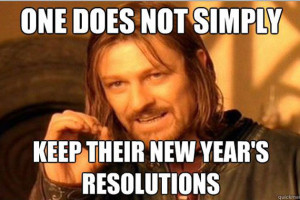You may have noticed that resolutions are hard to keep. If you're like me, you greet each new year with hopeful visions of a new self—and come Spring your day-to-day life has derailed your best intentions. I've certainly broken my fair share of resolutions.
In 2013 I approached things in a different way and I had far more success than in the past. Here's how I did it.
0. Sanity Check: Make Sure You Want the Result
Some resolutions sound great but when you look closer either they're not realistic or they just don't fit in with the direction of your life. Running 10 miles a week is an impressive accomplishment, but can your schedule accommodate the hours required? Will this habit help you be a better friend or have a larger impact on the world? Are there easier ways to gain the equivalent health benefits?
We make resolutions because we want our lives to change in some way. First ask yourself if the change is something you really want. Then ask yourself if sticking to the resolution perfectly is actually likely to cause the change you want—for me my honest answer is often no.
1. Have an Easy Goal and a Stretch Goal
We often don't know ahead of time how easy it will be to meet a challenge, so give yourself a range of targets.
Last year when I decided to eat less meat I didn't want to cut it out entirely. I needed to find a middle ground, a default focal point that I could shoot for. Since I didn't know how hard it would be I picked three: eat meat once a week (easy goal), once every two weeks, or once a month (stretch goal).
When I slipped up two days into January, I was able to be lenient without falling off the bandwagon entirely.
2. Predict Your Success
You probably know yourself pretty well, but can you really predict what you'll do? You told your friend you'd go to his dinner party but when Friday rolls around you're tired from work, it's cold and rainy, and you just found out that your archnemesis will be there. Do you still go?
Sometimes we have legitimate reasons for backing out of obligations and sometimes we just flake—and it's universally hard to tell these cases apart.
For each of your resolutions, predict how likely it is you'll be able to meet your goals. It might help to imagine someone else in your situation and evaluate their chances instead. For my eat-less-meat resolution I gave myself an 85% chance of succeeding at my easy goal, 75% for the medium goal, and 55% for the stretch goal. (I was optimistic, but I think not by much.)
The purpose of this exercise is give yourself a reasonable idea of what could go wrong rather than deriving accurate numbers. Speaking of what can go wrong...
3. Use Pre-Hindsight
Murphy's Law is inevitable, so roll with it. Here's CFAR’s "pre-hindsight" technique:
Imagine yourself six months from now and you've lapsed on your resolution. What went wrong? Maybe you went on vacation and cut loose. Maybe you lost your job. Identify the causes of failure and either address them directly or adjust your expectations.
Remember, failure is good, but you can avoid trying to fail.
4. Have a Way to Keep Track
Personally, I'm extremely motivated by seeing concrete progress—and Karen Pryor recommends doing this in Don't Shoot the Dog!: The New Art of Teaching and Training. There are scads of apps (Lift, Commit) and websites (Beeminder, stickK) that help you track your habits, but I'm a fan of Google Forms. Here’s a pretty good tutorial, or you can just dive in.
Alternatively, just keep a pen-and-paper notebook or day planner. (They still make those, right?)
Whatever you do, keep it simple and set up your system in advance. Like, now.
5. Imagine You Started a Year Ago
Things will inevitably be difficult sometimes. When you hit a bump the road imagine that you started a year earlier. Think about how much better your life is because of it. Are these benefits worth the little sacrifices you made way back then?
This is a great way to see things from the perspective of your future self.
6. Follow the Letter But Care About the Spirit
We set goals and rules for ourselves because it's easy to see whether we followed the rules or not—they are legible. But most of the time we actually don't care about the rules, we only care about their effect on our lives: rules are just a means to an end.
- Try to follow the rules.
- Breaking a rule is not an excuse to break it again.
- When you don't follow the rules to a T and you still improve your life, that's a win.
7. Write It Down
Do you remember your resolutions from last year? the year before? No? Write down your goals (easy and stretch) and your predictions in a place that's easy to find a year later: e-mail them to yourself or put them in your calendar. Write reminders on sticky notes and put them on your bathroom mirror or your monitor, inside your wallet, on your alarm clock.
8. Have Fun!
Change can be scary or it can be exhilarating and inspiring. Aren't you curious to see who you'll become by next December? You'll be amazed.
P.S. A Video
It turns out New Year's resolutions do work sometimes. Science!
comments powered by

